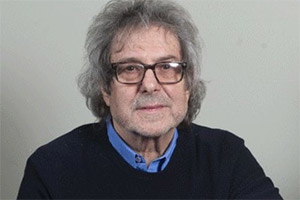
Ian La Frenais
- 89 years old
- English
- Writer
Press clippings Page 7
And Going Straight always has the copper-bottomed commodiously curved Ronnie Barker, looking like Father Christmas who has come to nick the toys.
Nancy Banks-Smith, The Guardian, 25th February 1978By relative standards, shows like Dad's Army and Porridge are miracles of observation, and even by absolute ones they are astonishingly good: the best of each (and both are getting repeats now on BBC1, thereby providing a feast of viewing) will never look entirely like period pieces, but will always retain their capacity to surprise. Compare the floundering abstractness of 'The Grove Family' to the subtleties of social nuance in 'Dad's Army': it's a clear advance.
Clive James, The Observer, 6th June 1976The special Yuletide edition of Porridge (BBC1) was probably the funniest thing on the air. There is no denying that Ronnie Barker is good in 'Porridge.' There is plenty of denying that he is good in many of those other things he does [...] but in Porridge Barker is delivering the lines of Dick Clement and Ian La Frenais, and is obliged to raise his game.
Clive James, The Observer, 28th December 1975For those who already know the Likely Lads, so far the radio version is sticking closely to the television scripts. However, last week when Thelma ends up accidentally in Terry's bed in the radio version it sounded as though she was naked whereas in the television version she wore a discreet petticoat. The best example I have heard of the old saw about preferring radio to television because the scenery is better.
Val Arnold-Forster, The Guardian, 16th August 1975In a script by Clement and La Frenais there is no question of the playing being ahead of the writing. The lines would get laughs ead cold, so anything the actors contribute is sheer gain. There are no miracles of timing in the show, but the personalities are cast to a nicety. Bob's moon face is all hope: Terry's grapefruit-sized head is all disillusion.
Clive James, The Observer, 4th May 1975Porridge is not particularly about prison, and if it were it might be distasteful or intolerable. It is about Barker, in shape and content an all-round bad egg, resisting to the last wriggle and wangel and back answer, the pressure of the system. So instinctively awkward that he lies about his height merely to deceive the doctor.
Nancy Banks-Smith, The Guardian, 22nd February 1975Whatever Happened To The Likely Lads? (BBC1) is repeating its last series. In our house we are watching it all over again.
Clive James, The Observer, 15th December 1974A rock solid script, by Clement and La Frenais. Good comic writing depends on a regular supply of real-life speech patterns - the main reason why success tends to interfere with talent, since it separates the writer from his sources.
Clive James, The Observer, 6th October 1974I'd like to say, and who shall stop me, how pleasureable the series Whatever Happened to the Likely Lads? (BBC1) has been. How funny and true. In spite of Keats, funny is the truth and truth is funny and that is all script writers need to know. Or nearly.
Nancy Banks-Smith, The Guardian, 4th April 1973But it's the writing that stars: Dick Clement and Ian La Frenais are plainly having a wonderful time raiding their own memories. Rilke once said that no true poet minds going to jail, since it leaves him alone to plunder his treasure-house. Writing this series must be the next best thing to being slung in the chokey.
Clive James, The Observer, 11th March 1973